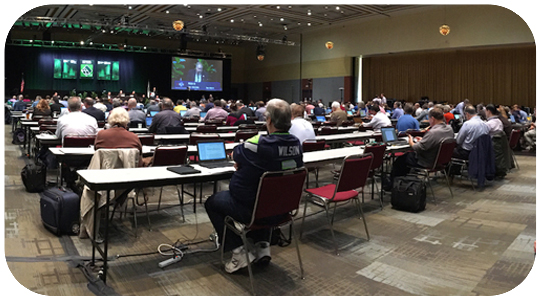
Congressional Fire Services Institute accepts resolution in support of three-year code adoption cycle
 Considering the many recent storms and natural disasters, the future resiliency of communities around the world has been the focus of many discussions regarding recovery efforts. When addressing a community’s resilience, up-to-date building codes and standards are one of the first action items. The International Code Council (ICC) works diligently to develop model codes and standards used in the design, build and compliance process to construct safe, sustainable, affordable and resilient structures. Developing construction and public safety codes through a consensus-based process, this system of code development has provided the citizens of the U.S. and many other countries the highest level of safety for more than 80 years.
Considering the many recent storms and natural disasters, the future resiliency of communities around the world has been the focus of many discussions regarding recovery efforts. When addressing a community’s resilience, up-to-date building codes and standards are one of the first action items. The International Code Council (ICC) works diligently to develop model codes and standards used in the design, build and compliance process to construct safe, sustainable, affordable and resilient structures. Developing construction and public safety codes through a consensus-based process, this system of code development has provided the citizens of the U.S. and many other countries the highest level of safety for more than 80 years.
In fall 2016, the Congressional Fire Services Institute (CFSI) accepted a resolution in support of the three-year code adoption cycle. “Whereas, the Institute recognizes and supports the adoption of model building and fire safety codes and standards as part of a comprehensive community risk reduction effort,” reads the resolution.
The resolution addresses the importance of communities adopting up-to-date codes, specifically within a three-year cycle acknowledging that “outdated codes impose a hidden fee that shifts costs and risks from builders to businesses, property owners and the jurisdiction.”
The “implementation of up-to-date building construction codes enable public policy makers to promote safe, resilient and energy-efficient communities, while use of outdates codes can expose citizens to potential safety risks.”
The destruction caused by the recent natural disasters emphasizes the importance of enforcing a three-year code adoption cycle. As stated in the resolution, “The Congressional Fire Services Institute supports federal efforts to educate and encourage state and local legal jurisdiction within the United States to adopt model building construction safety codes and standards in accordance with the three-year publication cycle employed by codes and standards development organizations.”
Released in September and reflecting the most advanced building science construction methods and practices available, the 2018 International Codes (I-Codes) are now available.







